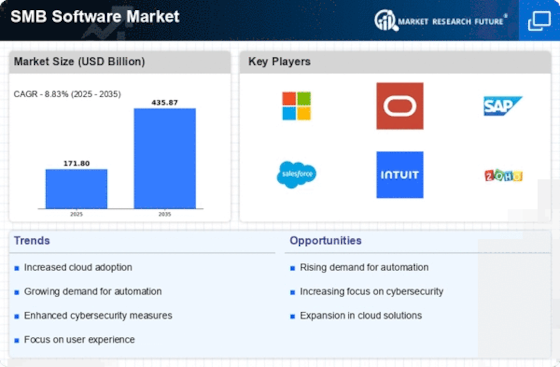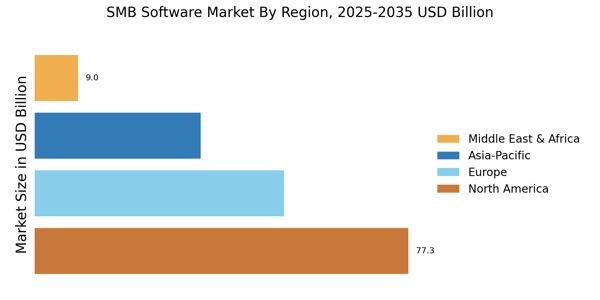Rising Importance of Data Analytics
The SMB Software Market is witnessing a rising importance of data analytics as businesses strive to make informed decisions. With the increasing availability of data, small and medium-sized enterprises are recognizing the value of analytics tools that can provide insights into customer behavior, market trends, and operational efficiency. Recent statistics suggest that around 60% of SMBs are investing in data analytics solutions to enhance their competitive edge. This trend indicates a shift towards data-driven decision-making, where software that offers robust analytics capabilities becomes a critical component of business strategy. As a result, software vendors are likely to prioritize the development of user-friendly analytics tools that cater to the specific needs of SMBs, thereby driving growth in the SMB Software Market.
Enhanced Focus on Cybersecurity Solutions
The SMB Software Market is marked by an enhanced focus on cybersecurity solutions as businesses become increasingly aware of the risks associated with digital operations. With cyber threats on the rise, small and medium-sized enterprises are prioritizing the implementation of robust security measures to protect sensitive data and maintain customer trust. Recent findings suggest that approximately 55% of SMBs are investing in cybersecurity software to safeguard their operations. This trend indicates a growing recognition of the importance of cybersecurity in business continuity and reputation management. Consequently, software providers are likely to innovate and offer comprehensive security solutions tailored to the specific vulnerabilities faced by SMBs. The enhanced focus on cybersecurity is expected to play a pivotal role in shaping the SMB Software Market, as businesses seek to fortify their defenses against evolving cyber threats.
Increased Demand for Remote Work Solutions
The SMB Software Market experiences a notable surge in demand for remote work solutions. As businesses increasingly adopt flexible work arrangements, software that facilitates collaboration, communication, and project management becomes essential. According to recent data, approximately 70% of small and medium-sized businesses have implemented remote work policies, driving the need for software that supports these initiatives. This trend indicates a shift in how SMBs operate, necessitating tools that enhance productivity and connectivity among distributed teams. Consequently, software providers are focusing on developing features that cater to remote work challenges, such as virtual meeting capabilities and cloud-based document sharing. This growing demand for remote work solutions is likely to shape the future landscape of the SMB Software Market, as companies seek to optimize their operations in a hybrid work environment.
Shift Towards Subscription-Based Pricing Models
The SMB Software Market is experiencing a shift towards subscription-based pricing models, which offer flexibility and affordability for small and medium-sized enterprises. This trend is driven by the desire for cost-effective solutions that allow businesses to scale their software usage according to their needs. Recent surveys indicate that nearly 65% of SMBs prefer subscription models over traditional licensing due to lower upfront costs and the ability to access the latest features without significant investments. This shift is prompting software vendors to adapt their pricing strategies, leading to an increase in Software as a Service (SaaS) offerings. As subscription-based models gain traction, they are likely to reshape the SMB Software Market, making advanced software solutions more accessible to a broader range of businesses.
Growing Emphasis on Customer Relationship Management
The SMB Software Market is increasingly characterized by a growing emphasis on customer relationship management (CRM) solutions. As competition intensifies, small and medium-sized businesses are recognizing the necessity of maintaining strong customer relationships to drive sales and retention. Recent data indicates that approximately 50% of SMBs are adopting CRM software to streamline their customer interactions and improve service delivery. This trend suggests that software providers are focusing on developing CRM solutions tailored to the unique needs of SMBs, including features such as automation, lead tracking, and customer support integration. The growing emphasis on CRM is likely to influence the trajectory of the SMB Software Market, as businesses seek to leverage technology to enhance customer engagement and satisfaction.

















